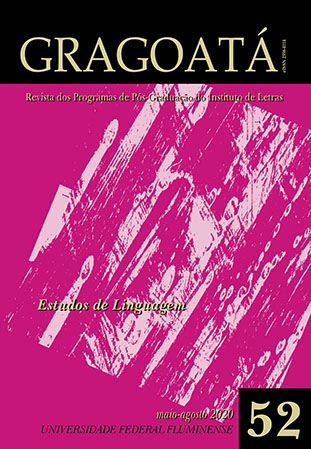Uma análise construcional das (de)formações lexicais com os nomes do atual chefe do executivo
DOI:
https://doi.org/10.22409/gragoata.v25i52.40810Palavras-chave:
Morfologia. Formação de palavras. Criatividade Linguística.Resumo
Neste artigo, tomamos por base um conjunto de cerca de 150 construções oriundas do nome do atual presidente da república, a exemplo de “bolsonero”, “boçalnaro”, “bozonazi” e “bolsolão”. Nossa principal meta é mapear os processos envolvidos nessas cunhagens expressivas e observar se um novo tipo morfológico, denominado de splinter, porção não morfêmica recorrentemente usada em séries de palavras, vem-se disseminando também em bases antroponímicas. Pretendemos mostrar o teor opinativo dessas construções, vinculadas à chamada função expressiva de avaliação (Basilio, 1987), bem como analisar os vários casos de desconstruções vocabulares envolvendo tanto o prenome (“Jair” > “já ir”) quanto o sobrenome do referido presidente (“Bolsonaro” >> “bolso cheio”), denominadas, nesta ordem, de decomposição sublexical e falso cruzamento vocabular (Henriques, 2007). Corroborando Fauconnier e Turner (2002), concluímos que a produção de sentidos através da manipulação lexical tem relação direta com os três Is da mente: Identidade, Imaginação e Integração. Para descrever e formalizar os processos, fazemos uso da gramática de construções, sobretudo Goldberg (2005) e Booij (2010).
Downloads
Downloads
Publicado
Edição
Seção
Licença
AUTORIZAÇÃO
Autores que publicam em Gragoatá concordam com os seguintes termos:
Os autores mantêm os direitos e cedem à revista o direito à primeira publicação, simultaneamente submetido a uma licença Creative Commons Atribuição 4.0 Internacional (CC BY 4.0), que permite o compartilhamento por terceiros com a devida menção ao autor e à primeira publicação pela Gragoatá.
Os autores podem entrar em acordos contratuais adicionais e separados para a distribuição não exclusiva da versão publicada da obra (por exemplo, postá-la em um repositório institucional ou publicá-la em um livro), com o reconhecimento de sua publicação inicial na Gragoatá.
A Gragoatá utiliza uma Licença Creative Commons - Atribuição CC BY 4.0 Internacional.











